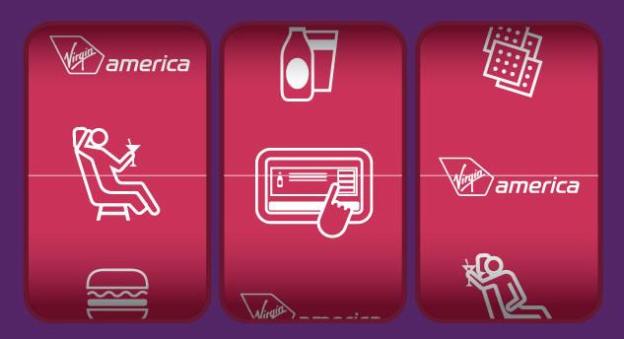
Announced through a humorous instructional video starring Sir Richard Branson, Virgin America has launched a new program called Seat-To-Seat Delivery service on the company’s entire fleet. Timed to celebrate a new route between Los Angeles and Las Vegas, the Seat-To-Seat Delivery service allows passengers to purchase regular or alcoholic beverages as well as food for another passenger on the plane and pass along a text message using the Red touchscreen terminals attached to the back of each seat.

Pitching the flirting angle within the promotional video, Branson says “Here’s my guide to getting lucky at 35,000 feet. First, pinpoint the object of your affection. Treat her, or him, to something delicious with the Red seat-to-seat delivery system…I say that your chance of deplaning with a plus 1 are at least 50 percent.”
Highly rated YouTube comments on the video have been somewhat pessimistic. Referencing the concept, one comment said “Because hitting on people in an enclosed space where nobody can possibly leave if they’re made to feel uncomfortable for several hours is obviously a really good idea…” Somewhat more to the point, another comment stated “Get rid of this service, take down this embarrassing video, and try to forget this ever happened.”
Passengers that do happen to utilize the service on a Virgin America flight can submit their stories on the company’s official Facebook page for a shot at winning free flights as well as a getaway to Las Vegas with hotel accommodations in The Cosmopolitan.

The leader of the group or parents of the family could purchase items for group members or children without having to get out of their seat to authorize a purchase when the food delivery cart is being pushed through the plane by flight attendants.
Regarding privacy, this service is slightly less intrusive than a social program that launched on KLM Royal Dutch Airlines during 2012. Called “Meet & Seat,” the airline allows passengers to share their Facebook and LinkedIn profiles in order to connect with other passengers on the plane. When passengers are checking out their seat assignment, they have the option of checking out social profiles, assuming that other passengers have opted in for the service.
A similar system on Latvian airline airBaltic also launched last year, but doesn’t require the passenger to connect to a social profile. Instead, the passenger can choose to sit next to other passengers that want to sleep, work, chat socially or talk about business. Passengers can also attempt to sit next to people that are of the same age or education level as well as passengers that speak the same language or participate in similar hobbies.


